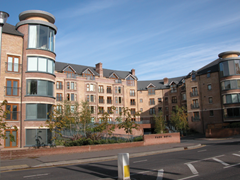Apartment Developments’ Management Bill
 Purpose: To facilitate fair, efficient and effective management of organisations which manage common areas in apartment blocks.
Purpose: To facilitate fair, efficient and effective management of organisations which manage common areas in apartment blocks.
Apartment owners usually pay their management company for the upkeep of the common areas of their properties e.g. halls, staircases, corridors, car parks and gardens. However, many owners reported neglect. In some cases, fire doors were jammed for months on end. In others, grass was left uncut outdoors over the summer. Owners have found existing laws ineffective for trying to solve these problems.
The Bill’s main aim is to improve owners’ rights, thus bringing Northern Ireland into line with Great Britain and the Republic. An Assembly resolution, describing the current law as “not currently adequate”, was passed on 9 November 2009. It called on the Executive to introduce new legislation but none has yet been published.
Alliance MLA Kieran McCarthy introduced the Bill on 15 November. McCarthy consulted over 3,000 people and organisations in advance and found “very strong support” from both owners and some management agents.
He had were adopting some parts of the Commonhold and Leasehold Reform Act 2002, which applies in England and Wales. This introduced a ‘right to manage’ and a new form of land tenure (commonhold), the first such innovation in several hundred years. However, he concluded that this was not appropriate for Northern Ireland’s circumstances.
Other options included altering the existing regulations for companies or consumer protection, establishing an ombudsmen service to adjudicate in disputes, or setting up a specific regime to regulate apartment management agents.
The MLA decided to go ahead with a Bill that dealt with the fundamental problems involved but he also wants to see a multi- agency approach to tackle them.
Owner management companies (OMCs) are a central part of the Bill, with unit owners automatically becoming members. There will be one vote per unit. Annual reports will be published and annual general meetings held.
If it becomes law, developers of new apartments will transfer the ownership of common areas to OMCs. Where a development has been completed or partially built before the law comes into force, that transfer will take place within six months. However, a developer will still be obliged to complete any development which has not been finished, and will have the necessary access rights to carry out that work.
All OMCs are obliged to introduce schemes of annual service charges (e.g. to cover cleaning, waste management, repairs, gardening and security) with each owner obliged to pay all service charges. All OMCs are also required to set up a sinking fund to pay for major repairs of common areas. OMCs also have the power to draw up house rules for the “quiet enjoyment” of the property. Regulations for house rules can be set down by the Department of Finance and Personnel.
When a development is complete, the developer must have over several documents to the OMC, including professionally prepared drawings, any safety file, manuals, titles and leases.
A property management agent for the development shall not act as the company secretary or director of its OMC. An agent must have a written contract between with the OMC, detailing the expected levels of service standards.
Enacting the Bill would have limited implications financially, as it defines existing liabilities and obligations. Ongoing costs associated with multi-unit ownership would be “fairly and responsibly managed” as a result.
First reading: 15 November 2010
Second stage: pending





